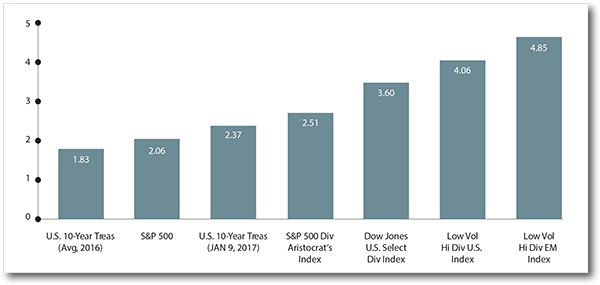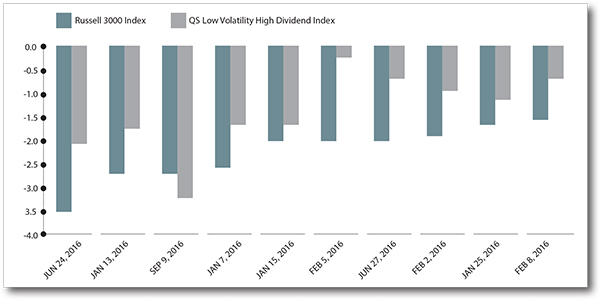
WT Wealth Management believed in and utilized a variety of low-volatility, dividend-paying Exchange Traded
Funds (ETFs) over the last several years. The low-growth, low-inflation, low-interest-rate environment made
those investments attractive, functional, and, frankly, "where the returns were." Post-election market shifts
have not diminished the case for a strategic allocation to low-volatility, high-dividend stocks, in our opinion.
But, what a difference a day makes. Donald Trump's Nov. 8 victory set in motion a rapid change in the
landscape for income investors: 10-year US Treasury yields rose sharply, rising nearly a full percentage
point to a post election high of 2.632% by mid-December 2016. Catalysts for this sudden spurt included
expectations for faster growth and higher inflation, driven by potential policy changes in Washington, D.C.
US stock prices also soared dramatically since Election Day, putting pressure on the effective yields of
dividend-payers in the process.
What could these shifts mean for yield-conscious investors whose investment managers have turned to
dividend stocks for income in recent years, favoring those with lower volatility? Does that approach still make
sense?
The answer is, yes! Investors' need for reliable sources of income is still acute, and yield is still hard to come
by without taking on fixed-income risk. Our huge rally in stocks, seemingly out of nowhere, emphasizes that
markets can change quickly-both for the worse as well as better.
The global economy and financial markets have been changing rapidly since the beginning of 2016, and that
trend seems to be continuing in 2017. Upcoming elections in Germany, France, and elsewhere in Europe signal potentially large shifts in policy. New political and financial realities are now complicating second-guessing
changes in financial markets; most recently, voter decisions that were expected to be negative for UK and US
stocks (Brexit, US election) had the opposite effect.
The potential uncertainty surrounding these changes is a reminder than one can't take any rally for granted
and that a defensive, low-volatility approach to equity income has a strategic place in a diversified portfolio.
Maintaining an allocation to low-volatility stocks is thus a prudent move, regardless of conditions at any
particular point in time.
The chart below highlights some popular yield comparisons on commonly held investments.

With rates seemingly on the rise, do equity dividends still look as attractive? Yes-and maybe even more so
than ever.
Though yields on US bonds shot up in the aftermath of the election, yields have pulled back after their post
election run-up. As of January 31, 2017, 5-, 10-, and 30-year treasury bonds were yielding 1.88%, 2.43% and
3.04%, respectively.
However, if the House passes any of Trump's campaign-trail promises, we could see explosive growth and a
quicker Fed path to increased interest rates. Many economists see as many as three or four rate increases this
coming year.
At WT Wealth Management, we would be more skeptical than that. After nearly a decade-long hiatus from
raising rates amid the financial crisis and subsequent fiscal meltdown, the last two years have delivered only
two rate hikes. We also predict two of them in 2017-in June, and sometime in the fall-based on jobs, inflation
and gross domestic product (GDP) numbers.
It's easy to forget, however, that the anticipated Trump policy changes that have pushed up bond yields
between the election and the Dec. 14 rate hike have yet to pass the Washington legislative gauntlet. However,
the dramatic move to a peak yield of 2.632% for 10-year Treasury yields may still feel low-and historically
they are, for they haven't been above the 4% mark in almost a decade, considering that the 50-year average
is over 5%.
How does this affect investors seeking income through bonds? The answer: a lot. If an investor holds the bond
to maturity, it is a "non-issue." But any time in-between, investors can suffer from "statement shock" as their
"safe" bonds lose 5%, 6%, or even 10% of their value in a short period of time.
Keep in mind that every 1% moves higher for the 10-year Treasury yield can result in nearly a 10% move lower
on the price of the actual bond. Bonds are not riskless-in fact, they carry a tremendous amount of risk when
you are in a low-rate environment and on the cusp of a sharp economic recovery. A move from the mid 2.5%
range on the 10-year to 4% would be devastating on bond portfolios.
With that in mind, at 3.60%, the current yield of the Dow Jones Select Dividend Index-which focuses on
stocks with the highest dividend yields-is still well above the recent peak in 10-year Treasury yields of 2.632%.
We at WT Wealth Management still believe that high-quality dividend-payers are an excellent way to invest
and eliminate the risk of a heavily laden bond portfolio, as described above.
So, given the very real prospect of range-bound GDP growth, equity dividends in general arguably remain an
attractive place to satisfy income needs-especially when one moves toward higher-quality dividend payers.

After the recent run-up, it's prudent to ask whether all gains will persist. The P/E ratio of the S&P 500 is 20.4x
as of January 31, 2017-a level unseen since the run-up to the Great Recession in 2008-9. With the S&P 500
and the Dow Jones Industrial Average (DJIA) at all-time highs, and the NASDAQ Composite above its 2000
Tech-Bubble high, some pullback would not be impossible but, in fact, is inevitable. Since the CBOE SPX
Volatility Index (VIX) currently stands at 12.25 as of January 31, 2016, near its 2006 low of 11.27 and its 20-year
low of 9.89 on January 24, 2007, at the beginning of the run-up to the Global Financial Crisis, there could
plausibly be more room for downside than for upside.
In a year in which investors have come to expect the unexpected, downside capture-the degree to which an
investment strategy outperforms its benchmark during market declines-has become a key concern for the
risk-averse. It's also something the investment professionals look at daily. We screen hundreds of investments
to find compelling "upside" capture stories but implement only those with exceptional "downside" capture
results.
In our opinion, a focus on profitable companies that exhibit low price and earning volatility is a reasonable way
to participate in equity-market upside while managing for clearly inevitable downside moves. Additionally,
a focus on higher-yielding names with solid earnings can lead to more attractive valuations, and potentially
smaller downdrafts during pullbacks, in what many consider to be an overbought high-dividend market sector.
One example of this effect: in 2016, the S&P 500 Low Volatility High Dividend Index showed noticeably better
(i.e., smaller) downside capture during the vast majority of market downdrafts during the year.
READY FOR CHOPPY WATERS AHEAD
Despite the recent outpouring of optimism, the year ahead could well be marked by uncertainty as the new
Trump regime in Washington moves forward with new policy prescriptions. Given the unprecedented changes
ahead and the current state of financial markets, it still makes sense to prepare for stormy weather while the
skies are clear, rather than waiting for the waves to rise-by maintaining a prudent allocation to low-volatility
strategies as part of a broadly diversified portfolio.
WT Wealth Management is looking ahead while not forgetting the past. We've made considerable changes
to client accounts in the past six weeks but continue to put prudent capital protection techniques ahead of
"full steam ahead." We are very optimistic and quite bullish, as the recent events in the equity markets have
rewarded our clients handsomely since Election Day.
The moral of the story is to make ground when the seas are calm and the wind is at your back, but to keep an
eye on the horizon for those short, sudden storms that can rock your boat and rattle your confidence.
WT Wealth Management is a manager of Separately Managed Accounts (SMA). Past performance is no indication
of future performance. With SMA's, performance can vary widely from investor to investor as each portfolio is
individually constructed and allocation weightings are determined based on economic and market conditions
the day the funds are invested. In a SMA you own individual ETFs and as managers we have the freedom and
flexibility to tailor the portfolio to address your personal risk tolerance and investment objectives - thus making
your account “separate” and distinct from all others we potentially managed.
An investment in the strategy is not insured or guaranteed by the Federal Deposit Insurance Corporation or any
other government agency.
Any opinions expressed are the opinions of WT Wealth Management and its associates only. Information is neither
an offer to buy or sell securities nor should it be interpreted as personal financial advice. You should always seek
out the advice of a qualified investment professional before deciding to invest. Investing in stocks, bonds, mutual
funds and ETFs carry certain specific risks and part or all of your account value can be lost.
In addition to the normal risks associated with investing, narrowly focused investments, investments in smaller
companies, sector ETF's and investments in single countries typically exhibit higher volatility. International,
Emerging Market and Frontier Market ETFs investments may involve risk of capital loss from unfavorable
fluctuations in currency values, from differences in generally accepted accounting principles or from economic or
political instability that other nation's experience. Emerging markets involve heightened risks related to the same
factors as well as increased volatility and lower trading volume. Bonds, bond funds and bond ETFs will decrease in
value as interest rates rise. A portion of a municipal bond fund's income may be subject to federal or state income
taxes or the alternative minimum tax. Capital gains (short and long-term), if any, are subject to capital gains tax.
Diversification and asset allocation may not protect against market risk or a loss in your investment.
At WT Wealth Management we strongly suggest having a personal financial plan in place before making any
investment decisions including understanding your personal risk tolerance and having clearly outlined investment
objectives.
WT Wealth Management is a registered investment adviser in Arizona, California, Nevada, New York and
Washington with offices in Scottsdale, AZ Jackson, WY and Las Vegas, NV. WT Wealth Management may only
transact business in those states in which it is registered, or qualifies for an exemption or exclusion from registration
requirements. Individualized responses to persons that involve either the effecting of transaction in securities, or
the rendering of personalized investment advice for compensation, will not be made without registration or
exemption. WT Wealth Managements web site is limited to the dissemination of general information pertaining
to its advisory services, together with access to additional investment-related information, publications, and links.
Accordingly, the publication of WT Wealth Management web site on the Internet should not be construed by
any consumer and/or prospective client as WT Wealth Management solicitation to effect, or attempt to effect
transactions in securities, or the rendering of personalized investment advice for compensation, over the Internet.
Any subsequent, direct communication by WT Wealth Management with a prospective client shall be conducted
by a representative that is either registered or qualifies for an exemption or exclusion from registration in the
state where the prospective client resides. For information pertaining to the registration status of WT Wealth
Management, please contact the state securities regulators for those states in which WT Wealth Management
maintains a registration filing. A copy of WT Wealth Management's current written disclosure statement discussing
WT Wealth Management's business operations, services, and fees is available at the SEC's investment adviser
public information website - www.adviserinfo.sec.gov or from WT Wealth Management upon written request. WT
Wealth Management does not make any representations or warranties as to the accuracy, timeliness, suitability,
completeness, or relevance of any information prepared by any unaffiliated third party, whether linked to WT
Wealth Management's web site or incorporated herein, and takes no responsibility therefor. All such information
is provided solely for convenience purposes only and all users thereof should be guided accordingly


